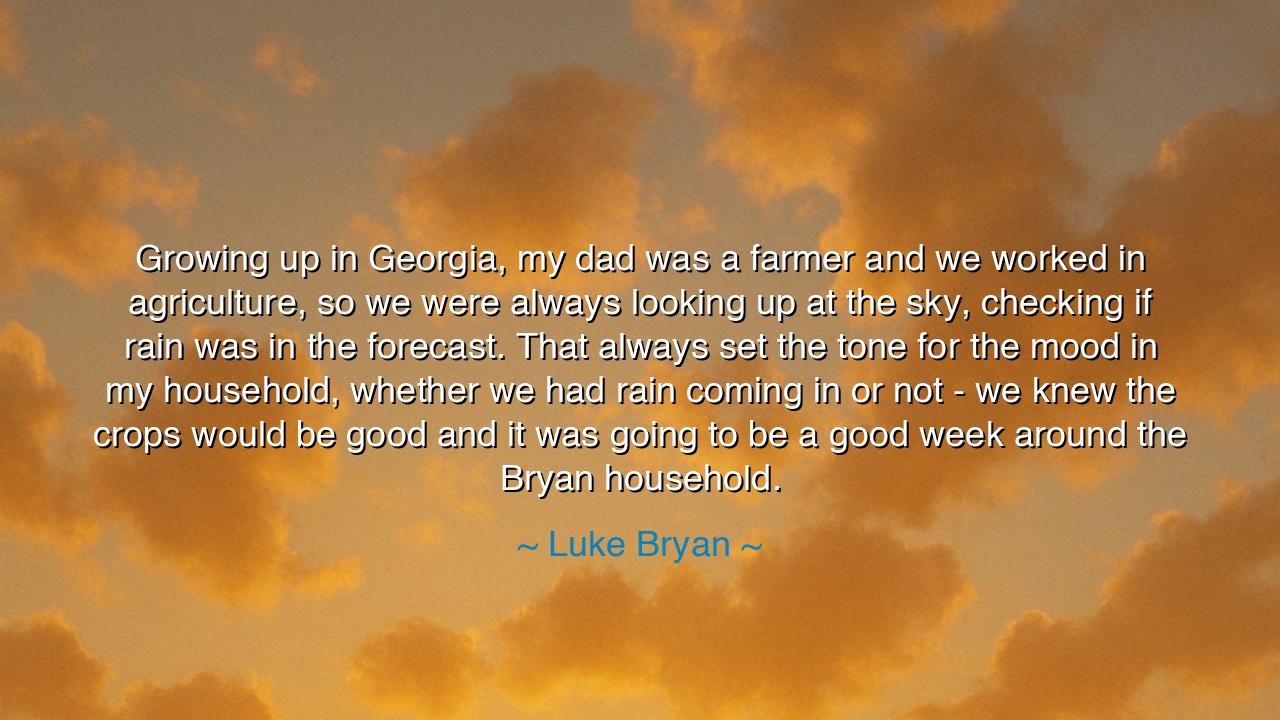
Growing up in Georgia, my dad was a farmer and we worked in
Growing up in Georgia, my dad was a farmer and we worked in agriculture, so we were always looking up at the sky, checking if rain was in the forecast. That always set the tone for the mood in my household, whether we had rain coming in or not - we knew the crops would be good and it was going to be a good week around the Bryan household.






“Growing up in Georgia, my dad was a farmer, and we worked in agriculture, so we were always looking up at the sky, checking if rain was in the forecast. That always set the tone for the mood in my household—whether we had rain coming in or not—we knew the crops would be good, and it was going to be a good week around the Bryan household.” Thus spoke Luke Bryan, the singer whose music carries the warmth of the southern earth and the rhythm of honest labor. In his words lies not only nostalgia, but a timeless truth: that human hearts, like the soil itself, are bound to the cycles of nature—that joy, hope, and gratitude are born not from what we possess, but from what we await with faith.
To live close to the land is to live close to the heart of existence. The farmer rises with the dawn and sleeps with the setting sun; his fortune depends not on power or wealth, but on the mystery of the heavens. When Luke Bryan’s family looked up at the sky for rain, they were not simply reading the weather—they were listening to creation itself. The clouds became prophets, the wind a whisper of destiny. Each drop of rain carried not only life for the soil, but peace for the spirit. In that rhythm of waiting and receiving, one learns the virtues of patience, gratitude, and trust—the same virtues that sustain all who labor with hope in uncertain times.
Throughout history, entire civilizations have shared this bond with the sky. The ancient Egyptians built their calendar around the flooding of the Nile, which was announced by the rising of the star Sirius. To them, the waters were not merely a force of nature but a divine blessing, a sign that the gods had remembered their people. So too did the farmers of Georgia, like Luke Bryan’s father, wait for the heavens to remember them. When the rain came, it was not just good weather—it was grace. The crops would rise, and with them, the spirits of the family. The home would fill with laughter, the air with song. But when the skies stayed dry, hearts grew heavy, and the silence of the fields echoed in the quiet of the household. Such was the ancient harmony between man and nature, still alive in the soul of every farmer who lifts his eyes to the clouds.
In the Bryan household, the mood of the week rose and fell like the seasons—proof that our inner world is often shaped by what lies beyond our control. Yet, this is not weakness; it is wisdom. For those who depend on nature learn humility before its power. They understand that no human effort can summon rain or delay drought. Instead, they live by the sacred rhythm of faith and acceptance, knowing that every dry spell passes, and every storm brings new life. In this surrender lies strength—the quiet, enduring strength of those who plant seeds without guarantee, believing that life will find a way.
Luke Bryan’s reflection also carries a deeper meaning beyond the field—it is a parable for family and community. When he says the rain “set the tone” for his household, he speaks of a shared spirit that bound them together through joy and struggle. Whether the forecast promised plenty or want, the family faced it as one. The father’s eyes on the horizon became the family’s compass; his faith became their peace. In this, we see the heart of rural life—a simple but profound truth: that unity is born from shared dependence, and that the greatest wealth is the bond of those who weather life’s seasons together.
The lesson is as clear as the southern sky after rain: we are all farmers in our own way, planting seeds of effort, waiting for the harvest of our dreams. Some days bring sunshine, others bring storm, but both are necessary for growth. We must learn to live as the Bryans did—grateful for the rain when it comes, patient when it does not, and always mindful that our mood, our hope, our faith need not depend on what the sky brings, but on how we meet it. For even in drought, there is beauty in perseverance; even in storm, there is music in endurance.
So, my child, when your days feel dry and your harvest uncertain, look up at the sky—not to despair, but to remember. Life, like the weather, cannot be commanded, only embraced. Plant your seeds with love, water them with hope, and wait with a calm heart. For as Luke Bryan’s words remind us, rain will come, and when it does, your spirit will bloom again. Until then, let your faith be your forecast, and your gratitude the sunshine that keeps your household bright—even in the darkest clouds.






AAdministratorAdministrator
Welcome, honored guests. Please leave a comment, we will respond soon